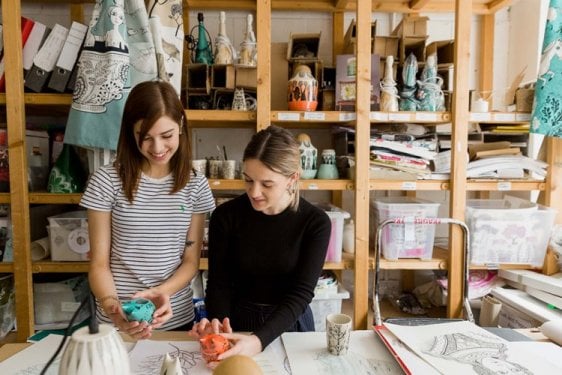
Photo: Kamil Kureylonek
Boosting employment in craft
Cockpit Arts’ programme of support for apprenticeships in the craft sector is delivering tangible benefits among micro craft businesses, says Imogen Lawry.
Cockpit Arts launched an employment programme for the craft industry in 2013 and since then has been dedicated to supporting young people to take up entry-level positions in micro craft businesses as business administrators and studio assistants.
We soon became aware that makers who take on employees demonstrate higher growth rates than their counterparts
The programme helps craftspeople offer sustainable employment to young people and creates an attractive route for them if they choose not to go to university.
Thriving businesses
The background to the programme is this. As the UK’s only business incubator for craftspeople, our aim is to support craft practitioners at the start of their careers, as well as those who are more established, to build thriving businesses. We closely monitor our impact and regularly report on the development of our beneficiaries as well as the wider impact of our services.
We soon became aware that makers who take on employees demonstrate higher growth rates than their counterparts, due in large part to the desire and ability to concentrate more on creative development, a key factor of success.
Because of this we were keen to establish an employment programme that not only developed the capacity of craft employers, particularly first-time ones, to offer sustainable employment, but that also supported young people to gain employment. All with the aim of changing the mindset and culture in the sector, reducing barriers to employment and creating more employment opportunities over the longer term.
Support for employers
The new apprenticeships we offer are a timely response to a recent study by the Crafts Council (Studying Craft 16 Findings: Apprenticeships). This highlighted that, although apprenticeships offer flexible entry into craft careers, potential craft employers may need more support before they can contribute effectively.
We provide support to craft practitioners at a stage when they are ready to grow and develop their businesses and take on employees. As an incubator, we are set up to deal with these challenges and able to develop a comprehensive programme of employer support.
This includes financial incentives to take on apprentices, support with recruitment and selection, signposting to payroll, employment law and legal advice, and leadership and management training developed in partnership with the Learning and Development Division at the Royal Bank of Scotland. There’s also ongoing coaching to support the employer and the young person, as well as support for managing the apprenticeship element of the role, including liaising with the college and assessors.
Lush Designs
To date, nine apprentices have been recruited, in addition to 13 paid graduate internship positions filled in the first few years. An example is Lush Designs, a homewares company, that took on two apprentices at our Deptford centre. Co-owned by Marie Rodgers and Maria Livings, it has shops in Greenwich and East Dulwich, as well as an online shop and stockists worldwide.
It was keen to support young people entering the creative industries, and although it did not need more staff, it saw an opportunity to create new jobs and help young people, knowing that many are taken advantage of through unpaid work placements and excessive overtime.
The young people recruited gain insights into how small creative businesses are run, have close interaction with the makers and earn a wage while they gain a qualification through learning on the job. All of this with the opportunity to work for and with established craftspeople, in roles that support different parts of the day-to-day running of a creative business.
Special partnerships
Over the past four years we have been able to build on the momentum of the programme and have explored different advertising and recruitment options. We have been working closely with our apprenticeship provider, Westminster Kingsway College, and have had good support from Camden Council’s apprenticeship team, as well as other organisations working with young people in London such as The Prince's Trust and A New Direction.
It’s been crucial to the successful implementation of the programme to partner with organisations that specialise in working with young people, so that we can work in tandem to demonstrate a progression route to employment.
We have also been developing a pipeline of employers ready to take on an apprentice. So far, we have been working closely with our maker community to raise awareness of and interest in business administration apprentices in the craft sector.
As well as running focus group sessions, we meet with businesses and work with them on a one-to-one basis to create new apprenticeship positions. Taking on an apprentice takes a certain level of commitment and understanding, so we work with businesses to get them ‘recruitment-ready’ over a 12 to 24-month period if they have not done this before.
Increasing employment
Just under 10% of makers based at Cockpit Arts now directly employ on a PAYE basis and the commitment to entry-level employment is high. This is an increase on numbers prior to the start of our programme, so we are hopeful that over the coming years we will increase employment and help ensure that craft practice is made more resilient.
Imogen Lawry is Business Incubation Project Manager at Cockpit Arts.
cockpitarts.com
Tw @Cockpit_Arts
This programme has been supported by The Drapers’ Charitable Fund, The Ashley Family Foundation and Creative & Cultural Skills.
Join the Discussion
You must be logged in to post a comment.